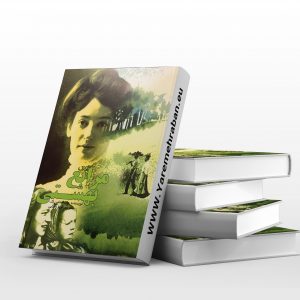Description
Short stories heinrich boll, first published in October 1950 by Friedrich Middelhaw Ferlag under the title “Wonder Comest de Nails Spa” 1956 Published by Arco Publishing Co., Ltd. The present collection is compiled from the stories of the period 1947 to 1951. Another larger collection, The Story of the Family, was published in December 1951.
Introducing the book Children are also civilians by Heinrich Bell
The stories we read in this collection were written between 1947 and 1951. The years when Europe had gone through a devastating war and was all over the place in astonishment. In these stories, Heinrich Bell narrates the story of soldiers and civilians who suddenly found themselves in a situation for which there was no escape. The war was a fateful one that swallowed up hope, but bright sparks flickered through the series’s stories.
It is the end of World War II and the German army is retreating, suffering successive defeats. Fine Halls is a member of the Army, based in Hungary and Romania. He sees the defeat and death of those around him every day. Hals is tired of war and is moving …
The Russians and the Americans occupy the German positions one by one and push them back. The lives of several German soldiers at this time in Hungary and Romania are narrated, one of whom is “Fine Hals”. He is an architect’s officer and he witnesses bitter events every day.
Tired of war, he is transferred from base to base every day. Hals, who sees the ruthless face of the war up close, witnesses the death of his loved ones, and after moving to a new base, realizes that …

Heinrich Bell was born on December 21, 1917 in Cologne. At the age of twenty, after graduating, he worked in a bookstore, but the following year, at the beginning of World War II, he was called up for military service and served on the battlefield until 1945.
Although his family was opposed to the Nazis and the National Socialist Party, he initially sympathized with them. He passed away.
The stories we read in this collection were written between 1947 and 1951. The years when Europe had gone through a devastating war and was all over the place in astonishment. In these stories, Heinrich Bell narrates the story of soldiers and civilians who suddenly found themselves in a situation for which there was no escape. The war was a fateful one that swallowed up hope, but bright sparks flickered through the series’s stories.
On the other side of the bridge
There is nothing special about the story I am going to tell you; It may not even be a story, but I have to talk to you about it. Ten years ago, this was the starting point, and a few days ago, this cycle was completed.
A few days ago, I crossed the bridge by train, which was once strong and wide before the war; Bismarck’s steely steel in all those memorable monuments and the flexibility of bureaucratic rules. A wide four-lane railway bridge over the Rhine, supported by a series of massive foundations.
Ten years ago, I used to cross the bridge three times a week: Mondays, Wednesdays and Saturdays. In those pre-war days, I was hired for a small number of hounds and Reich guards. In fact, I was kind of a pedophile. Of course, I did not know anything about hunting dogs and I did not have much training.
Three times a week, I took the train from Koenigstadt (where we were headquartered) to Grundheim (where we had a branch). There, I received instant correspondence, money, and “ongoing cases.” The latter was in a large wrapped paper folder. Of course, since I was just a courier, I was never told about the contents of the folder.
In the mornings, I would go straight from home to the station and take the train to my Grunders at eight o’clock. The journey took three quarters of an hour. Even in those days, crossing the bridge scared me. All the technical guarantees of the experts regarding the high load capacity of the bridge were in vain: frankly, I was scared. The mere contact of the train with the bridge scared me, and I was honest enough to admit it. The width of the Rhine is very large where we live.
With a trembling heart I always watched the slight tremors of the bridge and the threatening shocks that continued for about six hundred yards until I reached the railway embankment again. At this time, the sound of a more reassuring applause was heard, and then it was the turn of the green fields; Row after row of vegetable fields… and finally, just before Callencaton, a building appeared: in fact, I was staring at this house all the time, it was on a firm ground and my eyes were in close contact with it.
The exterior of the building was made of very clean light brown gypsum, and the window frames and panes all looked burnt brown. The building had two floors with three windows on the upper floor and two on the ground floor and was located in the middle of the main building, which was reached by three steps. If it did not rain heavily, a child would sit on the stairs without exception;
A slender little girl, nine or ten years old, holding a big, clean doll in her arms and looking at the train with a frown. My eyes always passed this child to sit next to the window on the right. Because every time I saw a woman there; A woman on her knees with a bucket on her side and a damp cloth in her hands, washing the floor of the room with difficulty. This story was repeated every time without exception, even when it was raining like a flood.
Even when the child was not sitting on the steps, the woman was always there: the back of her slender neck showed that she was the girl’s mother, and always the same movement back and forth and that special rubbing. Many times I wanted to look at the furniture or the curtains, but my eyes were fixed on this skinny woman who was constantly rubbing, and the train had passed before I could think of anything else. This always happened on Mondays, Wednesdays and Saturdays at eight and ten o’clock, because in those days, the trains were very timely. As the train passes in front of the house, only the clean behind-the-scenes view of the building remains silent and submerged in my eyes.
Short stories heinrich boll
Needless to say, I would have liked to have information about this woman and house. Other areas did not interest me at all. Kalenkaten, Broderkaten, Solnheim and Grundheim; There was nothing interesting about these stations. I thought I was always fascinated by this house. I would like to know, why does this woman wash and count three times a week? It did not seem at all that dirty people lived in this house or that many people came and went there. In fact, it does not have an inviting sense of purity; It was a clean but depressing house.
But when I got on the Grunder train at eleven o’clock to get back, I saw the back of the house just across the street just before noon. At this time, the woman was cleaning the windows at the far right window. Strangely, on Mondays and Saturdays, he cleaned the far right window, and on Wednesdays, the middle window. The woman with the red liver scarf around her head with the suede handkerchief in her hand is still counting and counting. I never saw the girl on the way back, and now that I was approaching home at noon (because it was a few minutes to twelve and the trains were extremely punctual in those days), this was the front view of the building, which was silent and isolated in front of my eyes.
Although I do my best to tell the story only what I really saw, I do not think anyone will disagree with my belief that I should be mathematically accepted after three months. On Tuesdays, Thursdays and Fridays, the woman must wash the other windows.
This combination, although it seemed trivial, gradually became an obsession. I often wondered which morning or afternoon the other windows of the building would be washed all the way from Cullencaton to Gronderheim. In fact, I used a pencil and paper to draw a timeline for myself. Based on what I saw during these three days, I was trying to figure out which of them would probably be cleaned in the next three afternoons and the remaining three days.
Because I had a strange idea that a woman does nothing but wash and rub. After all, I had not seen anything other than kneeling from a woman for days. So it was natural that I could imagine hearing the woman’s panting at eight or ten o’clock, which was hard to do, or just before twelve o’clock, while she was cleaning the window with suede, I could see the tip of her tongue, which was completely tucked between her lips. Is located.
1- Introducing the book Short stories heinrich boll on YouTube
2- Introducing the book Short stories heinrich boll in Aparat














Reviews
There are no reviews yet.